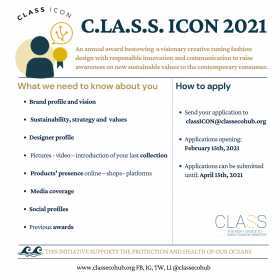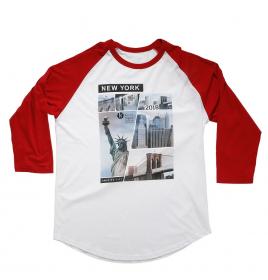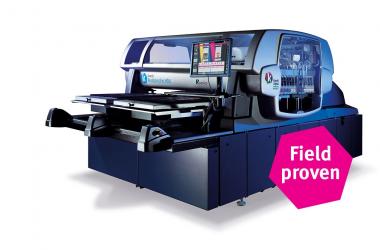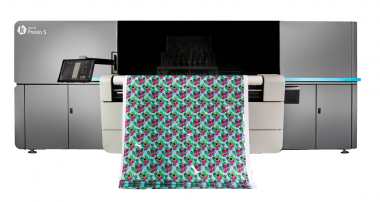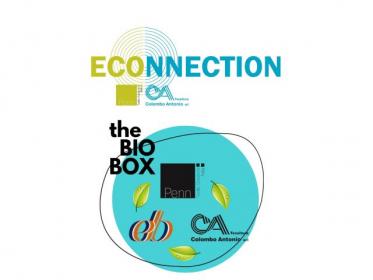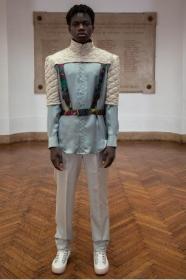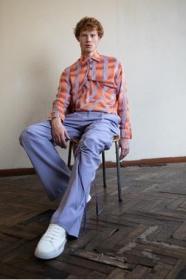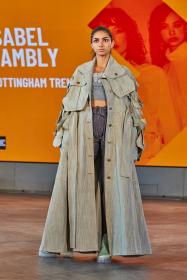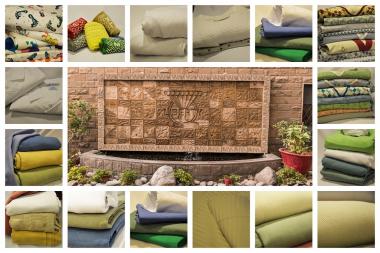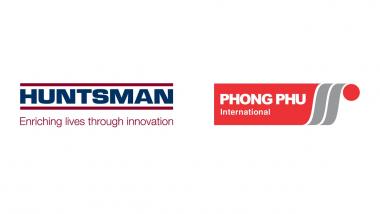CALL TO ACTION of C.L.A.S.S. ICON 2021
- C.L.A.S.S. launches the Manifesto for Responsible Fashion and kicks off the CALL TO ACTION of C.L.A.S.S. ICON 2021
- What does it mean to be a “game changer” in green fashion?
- What are the false myths of eco-fashion and what are the guidelines for innovating while safeguarding the planet? And how do you tell the story behind a sustainable fashion collection?
An annual competition to reward a visionary creative who combines design, responsible innovation and communication, capable of raising contemporary consumer awareness of the new values of sustainable fashion. This is the Call to Action launched to find the C.L.A.S.S. ICON 2021 by Giusy Bettoni of C.L.A.S.S. in the Smart Voices panel "C.L.A.S.S. ICON: Award and Manifesto for Responsible Fashion", moderated by the green journalist Diana de Marsanich, and starring, on the 10th February, the fashion designer Gilberto Calzolari, recipient of the international award for creative visionaries in the world of fashion C.L.A.S.S. ICON Award 2020, and Federico Poletti, Marketing and Communication Director of WHITE SHOW.
C.L.A.S.S. Manifesto
During the Smart Voice, the C.L.A.S.S. Manifesto for Responsible Fashion, the 2021 edition of the C.L.A.S.S. ICON competition and the Sustainability Formula were presented.
C.L.A.S.S. ICON Award is an international award for visionary creatives in the fashion world who are able to convey the values of sustainability not only to fashion professionals, but also to the wider public: consumers. "We created C.L.A.S.S. ICON to reward visionary designers who create their collections by combining design, innovation and responsibility and who are able to communicate the values behind their garments authentically and effectively to consumers. It's time for storymaking and storytelling to align, otherwise it's just greenwashing" says Giusy Bettoni.
From 15th of February to 15th of April it will be possible to apply by sending an email to classicon@classecohub.org, with a description and objectives of the brand, the sustainability values adopted and the strategy, the designer's profile, a photo-video story of the latest collection, and any previous awards won (all info on http://www.classecohub.org).
During the panel, designer Gilberto Calzolari, the first winner of the first C.L.A.S.S. ICON Award, shared his vision for responsible fashion and his current projects. "My brand is a laboratory of experimentation. I create fashion to open conversations and change the way people behave and think. My creativity, from the choice of fabrics and processes to the image I decide to communicate, are the weapons at my disposal. Since the beginning, I have been really excited to team up with C.L.A.S.S. in order to share a common and challenging journey, with the perspective to be part of a constantly growing network activating mutual support. I have always thought at my collections as a call to action for a better future and now more than ever my mission as C.L.A.S.S. ICON is to make people understand that commitment and sustainability can and must go hand in hand with beauty and elegance. The adage 'kalòs kai agathòs' is one of the classical teachings that should never be forgotten: aesthetics, in my opinion, is inseparable from ethics. That's why I don't just target professionals, but also the end consumer, fashionistas and beyond" says Gilberto.
"For the first edition of C.L.A.S.S. ICON in 2020 Gilberto was decreed as our chosen one, and the path together was sanctioned at that moment: the sharing of values and visions is an indissoluble bond that keeps us united over time. Like Gilberto, each ICON will be part of a community where together with C.L.A.S.S. will try to make a real smart fashion and above all create an important voice," says Giusy Bettoni.
In support of the C.L.A.S.S. ICON award, C.L.A.S.S. presented its Manifesto for Responsible Fashion, which summarises the values that C.L.A.S.S. has been researching, communicating and developing since 2007: the role of the ethical company and its transparent production, the importance of traceable and healthy products, with total respect for people and the environment. A commitment to a circular economy with a positive impact that also means safeguarding the seas, the ocean, the use of water, energy and resources.
"A Manifesto for fashion with the lowest possible impact on the planet and on people and animals’ health thanks to responsible innovation, perfectly up to the challenges of contemporary lifestyle. This is why I created the Sustainability Formula, which only exists when there is design, responsible innovation and we are able to track and measure the impact of products and processes and communicate the new values in an appropriate way. In a word, when there is knowledge" concludes Giusy Bettoni.
F = D x I x S x C
F= Fashion
D=Design
S=Sustainability
C=Communication
C.L.A.S.S. Manifesto for Responsible Fashion C.L.A.S.S. ICON award C.L.A.S.S. green fashion sustainable fashion Sustainability smart fashion
© 2021 GB Network Marketing & Communication







